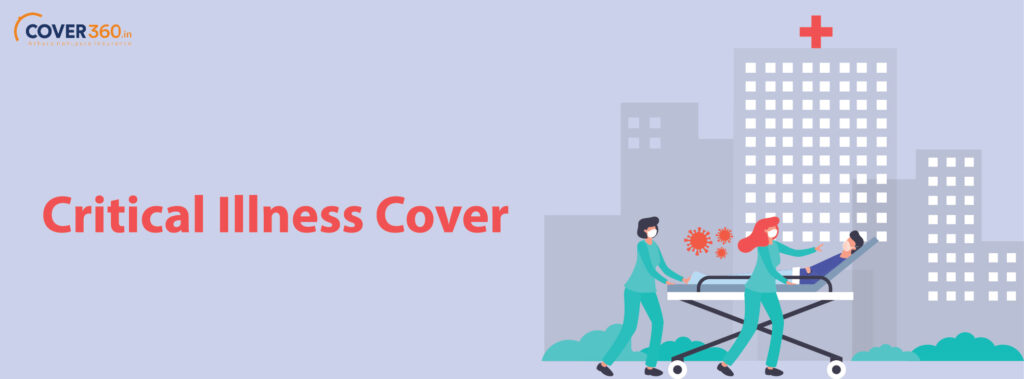A Critical Illness Cover or CIC lets you stay prepared for the worst. But how is it different from your standalone/ individual or family health insurance plan, or other available covers, like the conventional Maternity Cover? How do you make an informed choice? What exactly is the CIC?
What is Critical Illness Cover?
Critical Illness Cover promises you a lump sum if you are diagnosed with any of the illnesses covered in your insurance. These are critical illnesses, like cancer and cardiac arrest. The Critical Illness Cover can be standalone or as an add-on to your primary health insurance plan, so you do not have to make separate arrangements for securing yourself against the risk of a life-threatening or terminal illness. The coverage amount is greater than INR 1,00,000/-.
Why Invest?
Health plans come with caps and limits on the cost of treatment to be covered by the plan. Specific medical procedures may also not be borne by your health insurance. To prevent chaos at the time of urgent need, you must have a Critical Illness Cover to your name.
- A Critical Illness Cover leaves the policyholder reassured.
- The policyholder knows that they will have financial resources at their disposal in case of a medical emergency and to meet other short-term and long-term medical expenses on the covered critical illness without breaking into a sweat.
- Your Critical Illness Cover can be valuable income in the case of loss of ability to generate income.
- You may use it to pay off debt taken for meeting medical expenses.
- Moreover, this type of financial security brings the patient coveted peace of mind, allowing them to recover without stress.
There are a few significant factors that you must consider while deciding the sum insured for your CIC. Read on to know more.
Consider Your Age
- Your Critical Insurance Cover premium will automatically be lower if you invest in it when you are young, fit, and healthy.
- As a general rule, the lesser the risk of you having to claim your insurance, the lower the rate of premium you will have to bear.
- Most advise that one should get a Critical Illness Cover when the policyholder is around forty years of age.
- For most, the age of forty is the first financially stable juncture before old age- and the ailments that ensue.
Consider Inflation
- Inflation in the healthcare sector is inevitable.
- It would be best if you covered a little on the higher side, considering the same. An advisable sum would be about 15 Lakh Rupees.
Coverage Should Not be Equal to Life Insurance
- Remember, one gets their Critical Illness Cover lump-sum on diagnosing one or more of the ailments covered in the policy, whereas life insurance pay-out is received on death. They are different.
- Have a detailed look at your existing covers and the specific medical expenses they cover.
- Rationally estimate the overall cost of treatment and medicines.
- Remember that your standalone Critical Illness Cover can be ported to other insurers, whereas add-ons cannot.
- Life insurance policies usually feature longer tenures.
- The sum insured is also higher.
All Major Diseases Should Be Covered
- You can refer to your medical history and family medical history before choosing which diseases to cover.
- Look for trends in your family. Check for symptoms.
- Most policyholders cover about 8 to 30 major critical illnesses.
- A few common ones include- cancer, bypass surgery, heart attack, stroke, kidney failure, major organ transplant, and paralysis.
- Pay attention to the list of diseases excluded.
- Make sure your Critical Illness Cover complements your primary health insurance policy.
Consider Your Savings and Liquid Assets
- Take into account your treatment costs, recurring costs, and future financial liabilities if you lose your source of income during illness.
- Do not be underinsured because of your reluctance to pay high premiums or to save taxes. Similarly, do not overinsure because of lack of financial planning or, again, to save taxes.
- Your Critical Illness insurance should be affordable.
- Weigh your savings and liquid assets with an even hand. You will be able to figure out your limit to urgent medical expenditure. Accordingly, decide the sum you’re likely to need in case of medical emergencies.
- A safe way to go is to ensure lump-sum worth twice your current annual income
In these unpredictable times, it is best to stay prepared. Our medical infrastructure is crumbling already, and healthcare expenditures will only rise after the Coronavirus. Investing in a Critical Illness Cover is the safe way to move forward to a healthier life.
Need insurance advice? Let Cover 360 help you. We have many options and experts to help you in your policy decisions. You can contact our 24*7 toll-free number for assistance.
